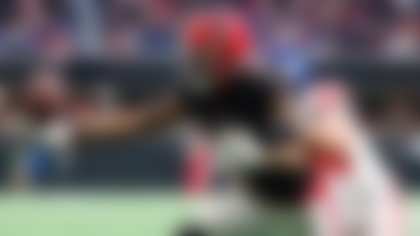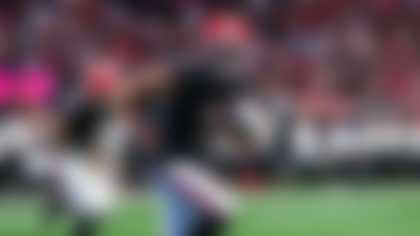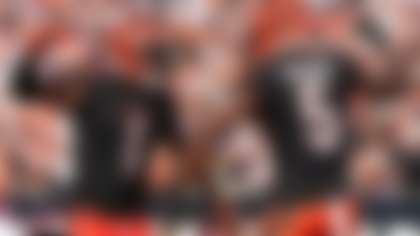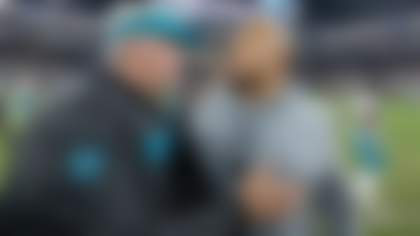Whether it was in Salem at the beginning of May, or at Harvard or on Cape Cod later in the month, Tom Brady has moved smoothly through each appearance he's made since the Wells Report was issued.
And what those close to the New England Patriots quarterback have noticed is how he's kept a level head through it all.
Yes, Brady is angered to some degree by the way the last six months have played out -- he's expressed those feelings to those preparing for this fight. Sure, it's fair to wonder if the vitriol from those around him is a truer projection of his genuine feelings. And no, we haven't heard word one from him publicly on how he feels about where this has gone, nor is he spilling on where he'll take it next.
All of that is by design. The union attorney hired to handle the case, Jeffrey Kessler, advised Brady to shut it down after his sit-down with Jim Gray at Salem State -- according to a source, Brady was paid $170,000 for the appearance; he gave $50,000 to his charity, "Best Buddies," and the remaining $120,000 to other charities -- and the 37-year-old signal-caller has done just that.
Tuesday's a big day, to be sure, with Brady's appeal hearing taking place in New York. And zipping it beforehand was the right move from a legal perspective, even if it left a void that so many people have been more than willing to jump on the airwaves and fill.
But because Brady and the Patriots and the NFL and the NFL Players Association -- and everyone -- pushed it this far, it's become about far more than whether or not a quarterback ordered a dozen game balls to be deflated.
Brady's notoriety is no small factor. Mike Tomlin used to tell his Steelers ahead of games, "It's a five-star matchup because we're in it" -- and that idea certainly applies here. The presence of an NFL icon raises the stakes across the board.
As for who will be in the room, that part is fairly standard for a big case. According to a league source, NFL general counsel Jeff Pash, vice president of law and labor policy Adolpho Birch and senior labor relations counsel Kevin Manara will be there on the NFL side. Per a union source, NFLPA general counsel Tom DePaso and outside counsel Jeffrey Kessler, as well as Brady's agent, Don Yee, will be there on the player's behalf. Brady will be there to state his case, as will, according to a source, Ted Wells, to defend his report. And of course, Commissioner Roger Goodell is the arbitrator.
All those guys have skin in this game, which is how we'll break this down ...
For the NFL
Maybe the most overlooked aspect of this entire proceeding is how the establishment of the NFL's new investigative arm, headed by former New York prosecutor Lisa Friel, factors into it.
Greg Hardy's case was the jumping-off point for it, as the league looks to become more proactive on its players' missteps and less reliant on law enforcement in assessing discipline. The problem is that the league doesn't have subpoena power and isn't putting guys under oath, which is why (in the league's eyes) lack of cooperation must be dealt with harshly. In that regard, Brady's timing couldn't be worse.
The bottom line: It's important to create a deterrent for players inclined to sidestep the process.
As I understand it, if Brady turns over the materials (text messages and emails) he failed to earlier in the year, it will help his case in a "better late than never" sort of way -- mitigating but not eliminating the damage done. The league also will be defending the integrity of its independent investigation, with Wells vs. Kessler likely being a pivotal battle inside the room.
And then, there's the commissioner's ability to preside over appeals, a power the office has had since 1968. That's important here -- even if it's been overblown at times -- for three reasons:
1) It falls under the "integrity of the game" heading, which is central to Goodell's job.
2) Goodell's name isn't on the discipline or the investigation, which raises the question, If he can't hear this, what can he hear?
3) Goodell hasn't served as an appeals arbitrator since he recused himself from that role in the Saints' bounty case back in 2012. And the NFL sees the union's fight as a clear attempt to renegotiate the CBA. In the 2011 labor negotiations, Goodell's power in this arena -- along with things like the franchise tag -- was seen as largely non-negotiable.
For the union
The league isn't the only party involved that sees the commissioner's power over appeals as a sometimes overblown aspect of this particular case. As the union sees it, if Barbara Jones' handling of the Ray Rice case or Paul Tagliabue's handling of the Saints case didn't force a sea change, this case probably won't either.
Still, that doesn't mean the union isn't ready to fight. If Goodell reduces the penalty to something acceptable to Brady, and the case doesn't go to federal court, that would have a way of cementing -- at least from a perception standpoint -- the commissioner as a viable appeals officer, and turn the tide of progress the NFLPA feels it's made over the last three years.
But much of the focus for the union in the aftermath of Tuesday's hearing (outside of the potential filing of a lawsuit) will center on due process, and whether or not Brady is afforded that in the time his counsel is given to present its case/witnesses and cross-examine the league's witnesses.
Remember, too, the NFLPA is going into this with a handicap of sorts, in that Brady used Yee and the Patriots' lawyers, rather than the union, to shepherd him through the Wells investigation. Basic labor law holds that an employee has a reasonable responsibility to cooperate with his/her employer, and that's spelled out explicitly in the CBA, as well. This puts the union in a tricky spot it could've avoided if it was involved earlier in this process to help Brady better manage that potential issue ahead of time.
For Brady
When it comes to the spectacularly decorated QB, this is largely about legacy -- and his resolve to keep the case going. In the days ahead of the hearing, it was important that Brady's side at least created the perception that he was going to the mat on this one, hanging the threat of litigation over the league's head even if that's not truly where the principal in this matter, Brady himself, wants to go.
They've done that.
The reality? Brady's history isn't to rock the boat. He wanted to help the union in 2011, but was uncomfortable with his name being on the lawsuit. His contract situations haven't always been perfect, but he's always left something on the table, and has never played a single snap in a contract year.
So if the league cuts the penalty to a game or two, centers it on the lack of cooperation and levies a fine for the actual transgression, what does Brady do? That much is anyone's guess.
At that point, Brady would have to make a decision, knowing the courts are loath to intervene in labor law, and that the burden for him would shift from the question of his guilt to a question of whether or not the league violated the CBA in investigating and punishing him (a significant difference). The road, overall, will get tougher, not easier.
Say training camp is underway when the decision comes from Goodell. Would Brady want to keep fighting or get on with 2015? His past history indicates he might want to put this all to bed.
Maybe he's sufficiently angry to go further this time.
In any case, it will probably be a while before we know where this is headed.
Follow Albert Breer on Twitter @AlbertBreer.











